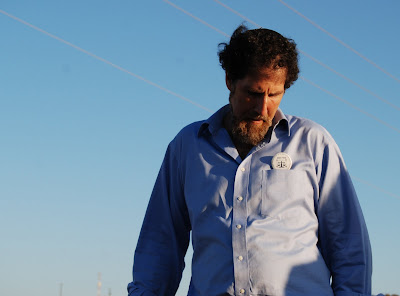
It’s not always obvious from the coverage, but among Jewish nationalists there have always been differences in politics – with some opposing the occupation, obsession with military might and the building of settlements.
Their voices may be quieter today than those of the hardliners, but some self-proclaimed zionists are desperate to reclaim the ideology from those they accuse of hijacking it.
American-born rabbi Arik Ascherman is one such individual. He describes himself as a fervent zionist but his attitudes could not be more different from those living in communities like Hebron.
As director of the Jerusalem group Rabbis for Human Rights, which marked its 20th anniversary this year, he spends his time protesting against injustice wherever he sees it.
Over the years he has become a thorn in the side of the Israeli authorities, with his efforts to stop demolitions of Palestinian homes in east Jerusalem and the West Bank – often standing in front of bulldozers as a human shield.
He plants olive and fruit trees to replace those ripped up from Arab land by militant settlers. Every year he and his supporters protect Palestinian farmers from attacks during the olive harvest. He has been attacked a number of times by settlers, who regard him as a traitor to the Jewish – and zionist – cause.
Ascherman is in despair at the radicalism that now dominates zionism and how the ideology has been “twisted” to justify what is happening in places like Hebron.
“For me the real zionism today is creating an Israel which reaches our highest Jewish values,” he says.
“And yet I look around me and cry out at what is happening to Israeli society – I look at the suppression of the Palestinian people – the home demolitions, the settler violence and I ask myself, ‘Is this what zionism has come to? Is this what we created the state of Israel for?’
“To be demolishing the home of this or that person whom we never gave a fair chance to build legally?
“The way to be a true zionist is to work for a better Israel. There is a false equation that if you voice any criticism of Israel you are delegitimising Israel at some level. I believe the opposite.”
He mission, as he sees it, is to remind Israelis that there is more to Judaism than dietry laws and keeping the sabbath. There is in fact a long tradition of respect for human rights.
His group calls for an end to the occupation, and acknowledges that all settlements are illegal.
Ascherman says: “We want to show Jewish Israelis that there are alternatives to the very dominant nationalistic understanding of Judaism.
“We want to make them realise that from a Jewish point of view there is a much more humanistic way of understanding our religion and treating our fellow human beings, wherever they are from.
“Who’s doing more for the long-term security interest of the Israeli state: The people who demolish homes and take olive trees? Or the people who stop demolitions and plant olive trees?”
Seeing so much suffering has not caused Ascherman to question his zionism, although he no longer believes the Jewish state’s claim to moral superiority.
“It reinforces my belief that this is a country fighting for its soul, that Zionism is fighting for its soul, that Judaism is fighting for its soul. But nothing, even after the terrible things I’ve seen, causes me to call the enterprise into question,” he explains.
“There is no fun in working every day in the darkest corners of a country that I love and a society that I love. But as a Jew, as a rabbi, as an Israeli, as a zionist, I’ve always wanted to believe that we’re better.
“Recognising our failings only reinforces my commitment to save the soul of Judaism. I see this as the moral thing to do.
“The real zionism should be working for an Israel that is not just physically strong, but also morally strong. That’s the right thing for its survival and is also the right thing to do.”
Menu